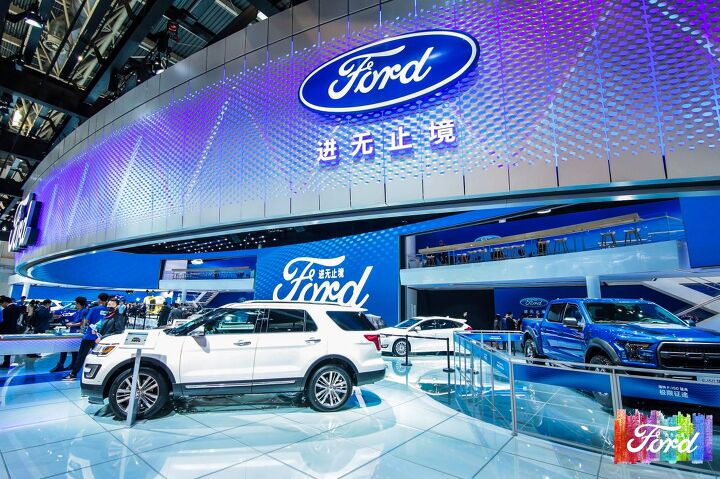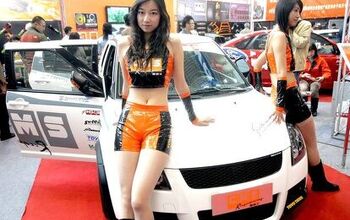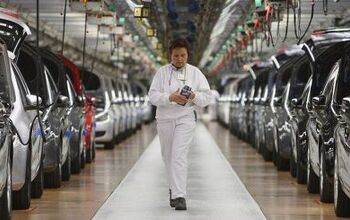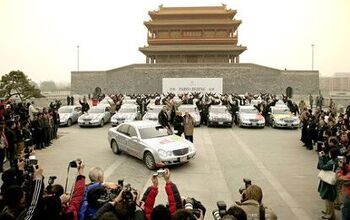World's Largest Car Market Continues Tanking

After rising steadily for almost three decades, China’s end of the economic seesaw seemed to hit its maximum elevation early last year, thus kicking off a swift plunge. For foreign automakers hoping to cash in on a burgeoning middle class hungry for cars, lofty dreams were pared back.
New vehicle sales in the world’s most populous country fell for the first time in 28 years in 2018, and the first two months of 2019 show no change in the market’s downward trajectory.
According to the China Association of Automobile Manufacturers (CAAM), buyers picked up 1.48 million vehicles in February — a 13.8 percent year-over-year decline, Reuters reports. That’s on the heels of a 16-percent decline in January, making February the eighth consecutive month of declining sales.
Economic factors turned cloudy last year, with the country ending 2018 with auto sales down 5.8 percent. This, from a market once viewed as nearly unstoppable.
While sales of “new energy vehicles” (electrics, plug-in hybrids) rose 53.6 percent last month, fuelled by a continued incentivization push from the country’s government, most of the automakers selling these vehicles are domestic.
“The trend experienced last year has continued into this year, and the economic situation has also been weak. This has dragged down consumption,” CAAM’s Deputy Secretary General Shi Jianhua told reporters in Beijing. “Consumers are also waiting for more government policies.”
The country’s leadership plans a number of measures to stimulate both the economy and car buying. First, there’s billions of dollars worth of infrastructure projects and tax cuts in the works. In rural areas, further measures are planned to encourage vehicle ownership, especially that of new energy cars.
Ford saw its fortunes take a hit in China last year, with its sales in that country falling 37 percent. General Motors didn’t fare quite as badly, recording a sales drop of 10 percent.
[Image: Ford China]

More by Steph Willems
Latest Car Reviews
Read moreLatest Product Reviews
Read moreRecent Comments
- Kjhkjlhkjhkljh kljhjkhjklhkjh A prelude is a bad idea. There is already Acura with all the weird sport trims. This will not make back it's R&D money.
- Analoggrotto I don't see a red car here, how blazing stupid are you people?
- Redapple2 Love the wheels
- Redapple2 Good luck to them. They used to make great cars. 510. 240Z, Sentra SE-R. Maxima. Frontier.
- Joe65688619 Under Ghosn they went through the same short-term bottom-line thinking that GM did in the 80s/90s, and they have not recovered say, to their heyday in the 50s and 60s in terms of market share and innovation. Poor design decisions (a CVT in their front-wheel drive "4-Door Sports Car", model overlap in a poorly performing segment (they never needed the Altima AND the Maxima...what they needed was one vehicle with different drivetrain, including hybrid, to compete with the Accord/Camry, and decontenting their vehicles: My 2012 QX56 (I know, not a Nissan, but the same holds for the Armada) had power rear windows in the cargo area that could vent, a glass hatch on the back door that could be opened separate from the whole liftgate (in such a tall vehicle, kinda essential if you have it in a garage and want to load the trunk without having to open the garage door to make room for the lift gate), a nice driver's side folding armrest, and a few other quality-of-life details absent from my 2018 QX80. In a competitive market this attention to detai is can be the differentiator that sell cars. Now they are caught in the middle of the market, competing more with Hyundai and Kia and selling discounted vehicles near the same price points, but losing money on them. They invested also invested a lot in niche platforms. The Leaf was one of the first full EVs, but never really evolved. They misjudged the market - luxury EVs are selling, small budget models not so much. Variable compression engines offering little in terms of real-world power or tech, let a lot of complexity that is leading to higher failure rates. Aside from the Z and GT-R (low volume models), not much forced induction (whether your a fan or not, look at what Honda did with the CR-V and Acura RDX - same chassis, slap a turbo on it, make it nicer inside, and now you can sell it as a semi-premium brand with higher markup). That said, I do believe they retain the technical and engineering capability to do far better. About time management realized they need to make smarter investments and understand their markets better.


































Comments
Join the conversation
Uber?
China's downturn has been coming for few years now, its been building up since the GFC. 18 million vehicles a year is still good, the bad is the overcapacity for vehicle production. This has been a trait in many Chinese industries, even realestate and construction. Sooner or later this over capacity will catch up and we will hopefully see to poorer investments go under rather than be propped up. The Chinese vehicle industry has many manufacturers and will need to rationalise them, eg, under performing manufacturers bought out by larger more profitable manufacturers. The Chinese are in the midst of a transitioning economy and maybe Trump's attempt at isolating the Chinese will accelerate the transition into a service based and modernised economy. This will make them richer and more powerful. We (OECD) might have been better off leaving the Chine as cheapass factory workers. The Chinese will adapt and hopefully as the people in China gain affluence the freedom for them will materialise. Or, as I reckon, China will have a civil war, between the capitalists (private sector) and Central Committee. The Provinces in China are in some cases almost autonomous and not as staunch at following the Central Committee as most think. China is communist, but Chinese society is capitalist. That's what we in the West need to target.